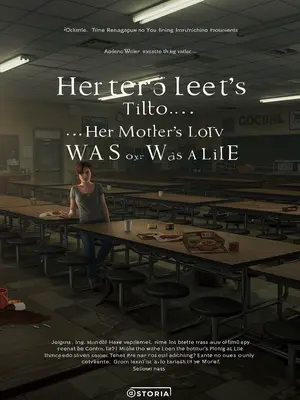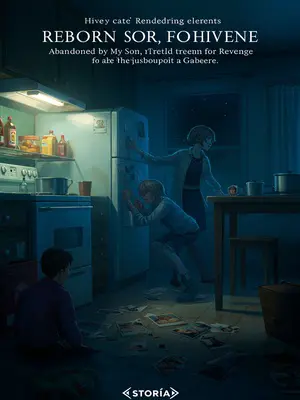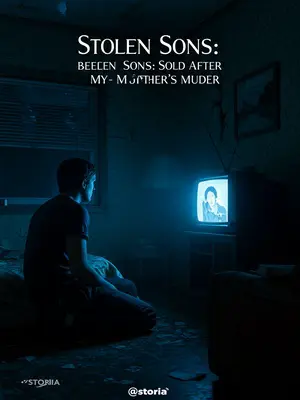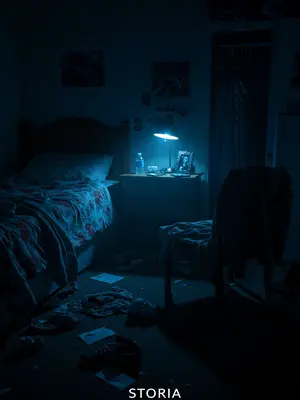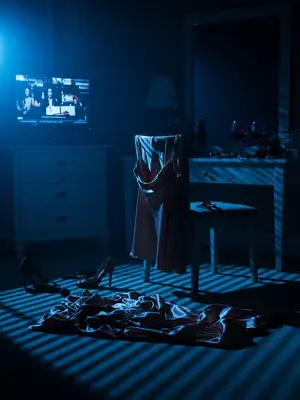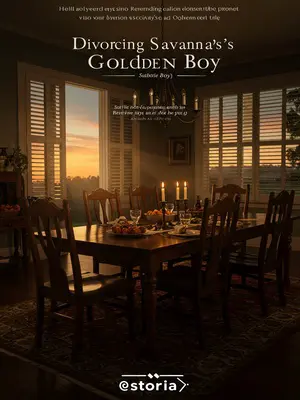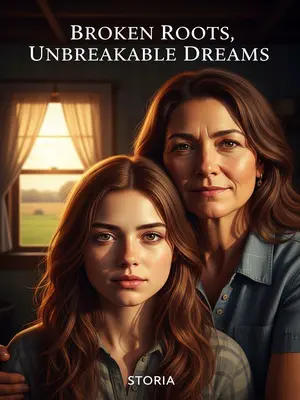Chapter 5: Justice and New Beginnings
The doctor’s voice was calm, but the words hit me like a punch. I stared at the ceiling, numb.
The police called my dad, and that day I learned the truth my mother had lied to me about for fifteen years. My uncle didn’t die because I wanted to eat berries, but because my mother, while pregnant with me, wanted to eat berries, and my uncle died in a car accident while buying them for her. It was an accident, and had nothing to do with me at all.
The truth was like a crack of thunder. I sat in the hospital bed, clutching the scratchy blanket, as my dad explained. The guilt I’d carried for so long was never mine to bear. It was never my fault.
That life debt that weighed on me day and night, suffocating me, that debt that made me endure and not fight back even though I hated Hailey, was a joke from the start. It was just because my grandparents blamed my mother for "killing" my uncle, and my mother wanted to shift her guilt onto me.
Fifteen years of shame and silence, all because my mother couldn’t bear her own guilt. I felt hollow, angry, and strangely free, all at once.
But that was fifteen years—a whole fifteen years!
I pressed my face into the pillow, tears streaming down my cheeks. Fifteen years. I would never get them back.
That day, in the police station, I glared at my mother with hatred for the first time. How I wished she could taste all the injustice I’d suffered for fifteen years.
My hands clenched into fists. I stared her down, daring her to look away. She couldn’t meet my eyes.
My dad was shocked after hearing this. He asked where all the child support he’d paid over the years had gone, why I lived so badly. The money he paid every month never reached me. All that money, along with my mother’s hard-earned cash, was spent on Hailey—on her little dresses, animal crackers, chocolate milk, dolls. But as her own daughter, I wasn’t worthy.
He demanded answers, his voice shaking with rage. My mother just stared at the floor, silent. She had nothing to say. I felt a strange satisfaction watching her squirm.
Hailey wore fashionable dresses, but as her real daughter, I only got faded, ill-fitting jeans and yellowed, holey T-shirts.
I remembered the feel of those scratchy shirts, the way they hung off my frame. Hailey would parade around in new outfits, while I tried to hide the holes in my clothes.
My dad was furious and shouted at my mother, "You two have no conscience, that’s money I worked hard to earn for Quinn! Chen, you witch, I will sue you, I won’t let this go."
His voice echoed in the police station, sharp and final. For the first time, my mother and Hailey looked afraid.
Maybe my dad looked too fierce. Even though the police held him back, my mother and Hailey shrank back in fear. Turns out, they could be scared too.
I watched them, a strange sense of justice settling in my chest. Maybe, finally, things would change.
After leaving the police station, I never wanted to return to that place I barely called home, but the question was where to live.
The thought of going back made my skin crawl. I wanted somewhere safe, somewhere I could breathe.
My dad wanted me to go with him, but I said I wanted to stay with my grandma. He asked why not go with him, and I asked, "Did you ask Aunt Melissa if I could?"
His face fell, and I saw the guilt flicker in his eyes. Aunt Melissa’s dislike was an open secret.
Aunt Melissa didn’t like me—I could tell. My bad relationship with my dad over the years was largely because of her.
I remembered her cold eyes, the way she’d purse her lips when I visited. I never felt welcome, never felt at home.
I remember a phone call when I was four or five. For a while, Hailey kept scaring me, saying if I upset her, her dad’s ghost would come at night to punish me.
The fear kept me awake for nights on end. I’d stare at the ceiling, heart pounding, waiting for the ghost to appear.
I was terrified and couldn’t sleep for days. Desperate, I secretly used Mrs. Patterson’s phone to call my dad, hoping to stay at grandma’s for a few days, but Aunt Melissa answered. Her voice was cold as she asked what I wanted. Even though I was very young, I could feel Aunt Melissa’s dislike, so I mumbled it was nothing. Aunt Melissa bluntly warned me, "Your dad has to take care of your brother now, he has no energy for you. Don’t call if it’s nothing."
Her words were sharp, final. I hung up the phone, tears streaming down my face. After that, I stopped calling.
After that, my relationship with my dad was completely cut off.
The silence grew between us, thick and heavy. I learned not to expect anything from him, or from anyone.
I moved to grandma’s house. Actually, I always liked grandma. But before, my mother hated me seeing grandma or my dad. She said my dad was heartless, and his whole family were bad people. Even if I saw grandma, she would soon drag me back, not allowing me to stay out overnight, saying there was a pile of chores at home waiting for me, and I shouldn’t think of slacking off outside.
Safe. Finally. Grandma’s house smelled like lavender and old books. She’d bake pies on Sundays, humming old country songs. For the first time, I felt a little bit safe.
My dad told me to rest first, because my eardrum perforation caused an ear infection, and I had to go to the hospital for dressing changes every day that week.
The hospital visits were a blur of antiseptic smells and gentle nurses. My dad would sit beside me, flipping through old magazines, trying to make me laugh. It almost worked.
The next day, he took me to school to fill out the application. The school notice said the application period was June 3rd to 5th, and today was the last day.
We rushed through the morning, my dad double-checking every form. He wore his best shirt, hair combed back, trying to look the part of a responsible parent.
But I didn’t expect to see my mother in the teachers’ office, apparently arguing with a teacher. When the teacher saw me, he immediately stood up and said, "Who said Quinn Delaney couldn’t come? Here she is!"
My mother’s face twisted when she saw me. The teacher’s relief was obvious, his smile warm and genuine. I felt a flicker of pride.
I roughly understood what was going on. It turned out I scored first in the county, so the school prepared a reward plaque and a $3,000 bonus. The teacher called my mother yesterday, but she didn’t tell anyone, and rushed to school alone to get the money.
She’d tried to claim my prize for herself, her greed on full display. The teachers, though, stood their ground. For once, the system worked in my favor.
But luckily, she had never attended a parent meeting, so the teachers didn’t recognize her. Even with my birth certificate to prove she was my mother, the teacher refused to give her the money, insisting on following procedure because there would be an award ceremony, and I had to be there to receive it and take photos. My mother, seeing the $3,000 so close yet unreachable, was anxious and started arguing with the teacher.
Her voice was shrill, echoing down the hallway. The other parents stared, whispering behind their hands. I kept my head down, embarrassed but strangely satisfied.
The teacher said he would ask the principal about the ceremony and told me to fill out the application first.
He handed me a pen, his smile encouraging. My dad squeezed my shoulder, pride shining in his eyes.
My dad took out a paper with four schools written on it, a bit silly as he said, "Quinn, I always thought your grades were bad, so I only looked at vocational schools for you. After I found out your score yesterday, I quickly picked these. See if they’re okay."
He looked sheepish, rubbing the back of his neck. I scanned the list, recognizing the names of my dream schools. My heart swelled. He tried. That meant something.
I took the paper and saw that it included three of the schools I had planned to apply to, which warmed my heart. He really put effort into choosing schools for me. He even said that even if my grades were bad, he would have let me go to vocational school.
For the first time, I felt like maybe he saw me—not as a burden, but as his daughter. I smiled, blinking back tears.
"Quinn, who are you giving that $3,000 to?" my mother suddenly spoke up on my left, her voice buzzing so I could barely hear with my right ear. I ignored her, just filled out the application with my dad, then the teacher came in to take me to the auditorium for the award ceremony.
Her words barely registered. I focused on my dad, on the forms, on the future that finally felt possible.
I held the red award plaque, took photos with the teacher, the principal, and all the school leaders.
The auditorium lights were bright, the applause warm. For a moment, I felt like I belonged, like I was more than the sum of my scars. I belonged.



